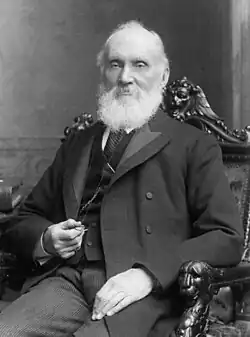Portal:Scotland/Selected biographies/32
William Thomson, 1st Baron Kelvin, OM, GCVO, PC, FRS, FRSE (26 June 1824 – 17 December 1907) was a British mathematician, mathematical physicist and engineer born in Belfast. He was the Professor of Natural Philosophy at the University of Glasgow for 53 years, where he undertook significant research and mathematical analysis of electricity, the formulation of the first and second laws of thermodynamics, and contributed significantly to unifying physics, which was then in its infancy of development as an emerging academic discipline. He received the Royal Society's Copley Medal in 1883, and served as its president from 1890 to 1895. In 1892, he became the first British scientist to be elevated to the House of Lords.

Absolute temperatures are stated in units of kelvin in his honour. While the existence of a coldest possible temperature, known as absolute zero, was known prior to his work, Kelvin is known for determining its correct value as approximately −273.15 degrees Celsius or −459.67 degrees Fahrenheit. The Joule–Thomson effect is also named in his honour. (Full article...) Read more ...